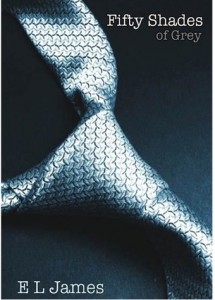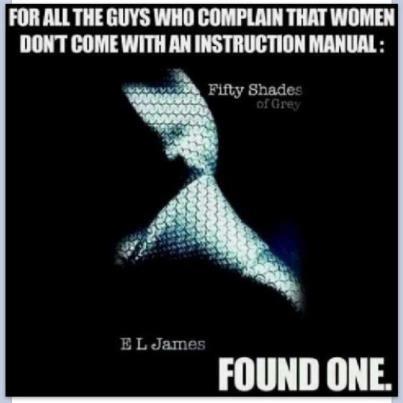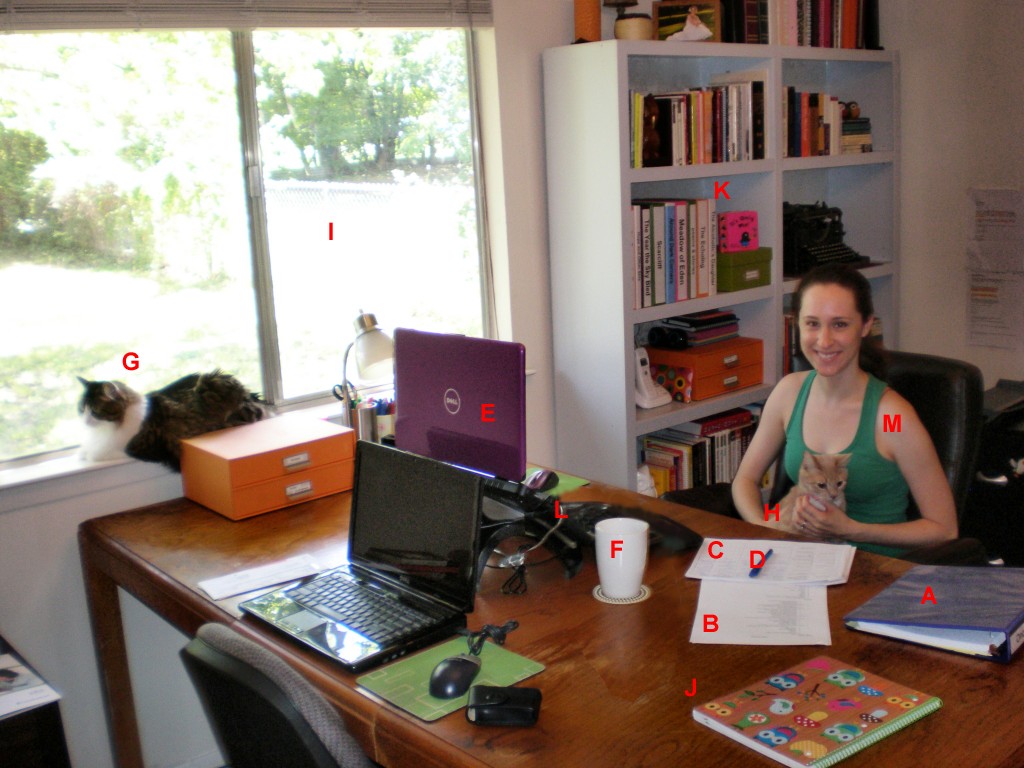This post is intended for adult readers over 18.
I don’t do book reviews, although I might be posting another blog on that topic soon. What I do do (heh) are book discussions. My favorite books to discuss? The mega-popular bestsellers that create polarizing opinions, such as Twilight. So surely y’all knew I would hit on Fifty Shades of Grey, right? (That’s right. I read them so you don’t have to. Sure.)

One of three covers you’ll see in every airport.
For those of you living under a rock, Fifty Shades of Grey is the first book in a trilogy by author E.L. James. It’s erotic romance in the BDSM sub-category, detailing the love affair and kinky sexual escapades of awkward, virginal Anastasia Steele and sexy billionaire Christian Grey.
The elephant in the room just got her period.
Okay. Right off the bat, let’s address the obvious: this book is about sex. It has lots and lots of sex, and that sex is very not-vanilla. I am constantly amazed by how many people are shocked by this. I guess they didn’t get a warning and/or don’t understand what these genre terms mean. Let’s break it down:
Erotic– As in graphic sex. And yes, the aim of erotica is to arouse the reader. If that makes you uncomfortable, this isn’t the book for you.
Romance– As in a relationship. A lot of romance novels weave in some sort of outside plot-line like the mysteries in Elizabeth Lowell’s books or the action plots in Celeste Bradley’s. Personally, I could do without these side-plots. Let’s be honest: most of us read romance—especially erotic romance—for the sex, not the murder mystery in the background. So why get upset when the romance is the plot? I don’t know. An unwillingness to admit to liking romances, maybe? Personal taste? Either way, Fifty Shades does away with everything but the central love story. If you need a plot outside of the relationship, this isn’t the book for you.
BDSM– As in an alternative sexual lifestyle between two consenting adults. Think: bossy dominants, handcuffs, whips, etc. There are many levels of BDSM, some of which many people actually practice in their sex lives without even realizing it (biting) and some of which most people would find highly disturbing (caning). This book floats somewhere in the middle.
Why are so many people scandalized (in a good or bad way) by these books? Probably because they had never read anything else in this genre. They say that’s how “housewives” (God, I hate that term) made this book popular: word of mouth about this new, racy thing. Truth: this is not a new genre at all.
Was I scandalized? No, although I do imagine that books 2 and 3 will get further into the BDSM side of things. Maybe I wasn’t shocked because before Fifty Shades came out, I was already very familiar with the later books in the Anita Blake series by Laurell K. Hamilton as well as the Loving on the Edge series by Roni Loren—both of which I loved.
The bottom line on the BDSM stuff? If the thought of a person willingly being tied to a bed horrifies you, this isn’t the book for you.
Let’s say it straight: these books started as Twi-hard fantasies.
Normally, I’m sort of a stickler for not bad-mouthing a book if you’ve never read it. That has always seemed incredibly hypocritical (and cowardly) to me. If it’s worth your time, read it and form a legitimate opinion. If it isn’t worth your time, why discuss it at all?
But Fifty Shades might be an exception. Pretty much every writer I’ve talked to about this book has one major, enormous, whopping problem: it started out as fan fiction for the Twilight series.
I genuinely haven’t made up my mind as to what I think about this aspect of the books. James changed the world they live in, their ages, professions, their personalities, and the plot. Is that really so different than a writer using a unique new genre to capitalize on someone elses’s success? (You know, those mid-list authors who pitch their books as “Someone Else esque.”) Is it morally wrong to lift an author’s characters and profit from it? I’m not sure. Does it feel sort of skeezy? Oh yeah. But it didn’t ruin my enjoyment of the book. That’s something you’ll have to decide for yourself.
But is the writing any good?
I think Nathan Bransford has said it best in this post. Short answer: no, not really. It’s not horrible. I’ve certainly read worse. But my critique group could have this baby polished and tightened up in a month, and the book would be better for it. I’ll break down some of the things that stood out to me.
Negatives:
Lots of internal dialogue of the gee-golly-whiz variety. Too often, too enthusiastically, and too innocently. I got sick of reading “jeez,” “Wow!” and “Oh my.”
An inability to use the appropriate words for sexual anatomy. Most importantly, female genitalia. I.e., she says “down there” a lot. If you’re going to write R-rated stuff, embrace it. Go for the four-letter words. Hell, she can’t even say “ass” or “butt”; she uses “bottom” or “buttocks.” In the middle of a sex scene. Come on.
I will say that I agree with Nina Badzin on this: if I never hear the phrase “my inner goddess” again, I will die a happy woman. James was going for a personification of Ana’s conscience and sexual appetite, and I respect that sort of risk, but it didn’t work for me.
The ending is not truly an ending. It is very clearly the first book in a series, which I don’t like. To me, that is just lazy plotting.
Positives:
It reads very fast. I could barely put it down; finished it in three work days. To me, that sort of momentum is fun to get wrapped up in, even if the book isn’t perfect. I’ve heard more than one person say they got bored during the sex scenes, which I’m baffled by. But then again, in my teenage years I devoured cheesy romance novels like they were free pizza and I was a starving college student, so maybe I have a high tolerance for extended sex scenes.
I actually found the characters pretty charming. Ana is delightfully awkward and usually pretty straight-forward in what she’s thinking. She’s innocent, but not in a “oh no, not Mr. Big Bad Wolf” sort of way… more of a “I don’t know what’s going on, but I damn sure like it” sort of way. In other words, she knows what she wants (sex with this hottie) and she goes for it. And Christian… well, he freaks a lot of readers out. Yes, he is overbearing and stalkery (which I happen to adore in a literary love interest… Heathcliff, anyone?). But he’s also sweet, clever, and intelligent. I liked him. I loved the two of them together.
The sex is sexy. You know, if you’re into that sort of thing.
There were emails back and forth throughout that I found absolutely adorable. I chuckled aloud several times. Ana and Christian had some nice wit going back and forth. They had fantastic chemistry.
Thoughts about sex as a social issue, and what writer responsibility has to do with that.
I’ve blogged about this concept before, here. I think it will be a tad easier to cover this time, since these books were never intended for teenagers. The whole “is it BDSM or sexual abuse thing” is further from the conversation, as these are both consenting adults. (And I will say, the fact that this book is inspired by Twilight does support my theory that Edward and Bella were just kinky, not in an abusive relationship. But back on track.) On the other hand, this meme:

No no no no no. That is not how it works, fellas.
just goes to show that even adults have a hard time seperating real life from fiction. So yes, some of the sexual implications in this book bother me–although they’re probably not the ones you’re thinking.
The virgin myth. Entire books have been written about this. It’s too involved to really get into here. But it’s an important issue, and Fifty Shades plays right into it. Ana is a lovely 22 year old virgin who’s never even gotten to second base or had a boyfriend. Okay, sure. There are some of those out there. But what’s the point of making this subsequently sexually explosive character one of them?
Female anatomy. Okay, beyond the fact that every sexually active human should thoroughly educate themselves with both male and female anatomy (it’s not simple, folks; do your research), it seems to me that an author writing primarily about sex should DOUBLY educate herself. Which means (as I mentioned above) not being afraid to use the right terms, as well as knowing that the hymen is outside the body. And, even better, not mentioning the hymen at all. Many modern virgins don’t even have them. Why on earth is the romance genre so obsessed with hymens?
Presenting the hero of a BDSM novel as “fucked up” emotionally—and using that as the reason he’s chosen that sexual lifestyle. I’m a little conflicted on this. On one hand, I appreciate that James gave the character depth and internal conflict. On the other hand, I think the BDSM community is stigmatized enough without her justifying his choice through abuse, etc.
Orgasms. Another topic that deserves an entire post of its own. I’ll shorthand it: too many orgasms. Too easy (she’s a virgin who’s never even masturbated). And many of them with no clitoral stimulation. Isn’t it time we stop portraying sex this way? It makes women think that’s how their bodies should work and it makes men think that’s how to get things done. Just… stop it.
The hilarity factor.
Just like sparkly vampires, Fifty Shades is an easy target. Some strange writing quirks make it easy prey. Add to that: everyone loves to make fun of something that’s popular, sex makes people uncomfortable, and this sex is non-standard and people fear what they don’t know. Yeah, it’s pretty easy to mock.
A little bit of poking fun is fine. Some naughty puns. This one of “Morgan Freeman” (comedian Josh Robert Thompson) doing a “reading” is particularly funny, in my opinion, especially taken out of context. (Warning: this is from book 2 or 3 and does contain a spoiler.) Good natured teasing, I’m all for. Blind bandwagon jumping? Not so much. At some point, you have to stop and ask yourself why you’re making fun of something.
So, is it worth a read? (Final thoughts for readers.)
This is actually a complicated question. Did I enjoy the book? Yes. I gave it four out of five stars on Goodreads. (Although, to be fair, I rate different types of books independently of some cosmic scale where all books are equal. In other words, The Giver and Twilight do not get judged by the same criteria.) I will definitely check out the sequels from my public library. Would I recommend the book to a friend? Probably not. Definitely not without some discussion first. So, dear blog reader, should you read it?
Reasons yes:
It interests you.
You want to form your own opinion.
You love the BDSM erotic romance genre.
You’re curious and open-minded.
You’re a writer who wants to learn.
Reasons no:
It doesn’t interest you.
Mediocre writing is a deal-breaker for your enjoyment.
You don’t like reading kinky or graphic sex.
You passionately hate Twilight.
You’ve already made up your mind.
Final thoughts for writers.
A lot of writers waste a lot of energy hating on and slamming books like Twilight and Fifty Shades. But in my opinion, that’s useless. What do we gain from that? Bitterness? The real questions we should be asking ourselves: why were these books so successful, and what can I learn from that?
~ * ~
So, have you read Fifty Shades of Grey? What did you think? Rants and raves alike welcome below. =)

















